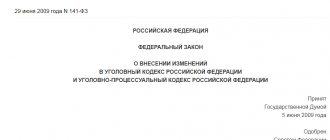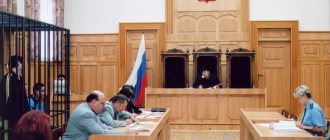Article 125 of the Code of Criminal Procedure of the Russian Federation. Judicial procedure for consideration of complaints (current version)
So, for example, in the Review of judicial practice of the St. Petersburg City Court on consideration of complaints under Art. 125 of the Code of Criminal Procedure of the Russian Federation for the first half of 2007, which was sent to the judges, is stated with reference to the “legal position of the Constitutional Court of the Russian Federation”, which are not subject to consideration in accordance with Art. 125 of the Code of Criminal Procedure complaints against “investigator’s decisions to refuse to satisfy various types of petitions.” Apparently, the authors of the Review proceed from the fact that refusal to satisfy petitions does not go beyond the scope of the procedural relations themselves, and violations committed in this case can be corrected during subsequent judicial review, therefore, the right to appeal in accordance with the above-mentioned decisions of the Constitutional Court of the Russian Federation and does not arise. At the same time, however, it is not taken into account that after the entry into force of the Code of Criminal Procedure of the Russian Federation, references to rather limited criteria for the admissibility of appealing to the court the actions and decisions of investigators, investigators and prosecutors at the pre-trial stages, formulated by the Constitutional Court mainly even before the adoption or entry into force of the Code of Criminal Procedure of the Russian Federation, in our opinion, are no longer relevant. According to Part 2 of Art. 79 FKZ dated July 21, 1994 N 1-FKZ “On the Constitutional Court of the Russian Federation” the legal force of the decision of the Constitutional Court of the Russian Federation declaring an act unconstitutional cannot be overcome only by re-adopting the same act. In this case, first of all, by the Resolution of the Constitutional Court of the Russian Federation of March 23, 1999 N 5-P, and after it and other decisions on the merits, the absence in the previous criminal procedure law of provisions on the right to appeal decisions and actions to the court was declared unconstitutional leading to violations of constitutional rights and freedoms, and assigning the task of considering such complaints to prosecutors. The current Code of Criminal Procedure of the Russian Federation does not overcome this provision by re-banning appeals; on the contrary, it develops the position of the Constitutional Court in a democratic direction. It is hardly legitimate to assume that the Federal Law “On the Constitutional Court of the Russian Federation” can deprive the legislator of the right to develop legislation along this path. Paragraph 2 of the Constitutional Court Resolution No. 5-P of March 23, 1999 also states that “the court, when checking during the preliminary investigation of certain procedural acts, SHOULD NOT PREJUDGE ISSUES THAT MAY SUBSEQUENT BE THE SUBJECT OF CRIMINAL PROCEEDINGS CASE (emphasis added - A.S.). Otherwise, it would be contrary to the constitutional principle of judicial independence...” In the Determination of June 20, 2006 N 240-O, as an example of a decision that is not subject to appeal under Art. 125 of the Code of Criminal Procedure provides, in particular, “the determination of the need to obtain and study new evidence, i.e. resolving those issues that in the future, after the prosecutor has transferred all the materials with the conclusion to the court, may become the subject of judicial proceedings to review the sentence.” However, one can hardly agree with such an interpretation. It is quite obvious that the court’s decision on the need to satisfy the requests of the participants in the process, primarily those related to the collection and verification of evidence, is in no way capable of predetermining issues that may subsequently become the subject of trial, since the verification of the legality and validity of the refusal of the investigative bodies to satisfy such petitions are in no way connected with the predetermination of issues affecting the essence of the criminal case (the issue of criminal liability). Taking into account the above, the opportunity that opens up for participants in legal proceedings to appeal against violations of constitutional law, formulated in the form of a ban on the use of judicial evidence obtained in violation of federal law (Part 2 of Article 50 of the Constitution of the Russian Federation) becomes of particular importance. In practice, this means that any investigative or other procedural action to collect and verify evidence can be appealed to the court on the grounds of violation of legal requirements during its implementation. Together with the right of the defense attorney to collect evidence (Part 3 of Article 86 of the Code of Criminal Procedure) and the right to appeal to the court the refusal of the preliminary investigation bodies or the prosecutor to satisfy requests, including the collection and inclusion of additional evidence in the case (Article 122 of the Code of Criminal Procedure), this is in significantly contributes to the adversarial equalization of the position of the prosecution and defense in the field of evidence during the preliminary investigation. However, often prosecutors and judges participating in court hearings to verify such complaints believe that appealing investigative actions and the admissibility of their results (evidence obtained) in accordance with Art. 125 is illegal, referring to the provisions of Part 4 of Art. 88 of the Code of Criminal Procedure, which talks about the right of the court to declare evidence inadmissible at the request of the parties or on its own initiative. Article 88, in turn, contains a reference to Art. Art. 234, 235 of the Code of Criminal Procedure, where we are talking about a preliminary hearing. Hence, it is incorrect, in our opinion, to conclude that the court has the right to consider this issue only during a preliminary hearing. Firstly, in Art. Art. 88, 234 - 235 refers to the consideration of the issue of admissibility of evidence only at the request of the parties or at the initiative of the court, and not in the order of appeal, i.e. in a different procedural situation and form. Secondly, part 4 of Art. 88 only requires the use of the procedure for declaring evidence inadmissible, provided for in Art. Art. 234 - 235 of the Code of Criminal Procedure, but by no means resolve this issue solely at the stage of scheduling a court hearing in the form of being brought to trial. This procedure, indeed, contains a number of special rules designed to most effectively resolve the issue of the admissibility of evidence (on the distribution of the burden of proving the admissibility of evidence, on the possibility of interrogating witnesses during the verification of the admissibility of evidence, other verification of evidence, etc.), however, these rules can (and should) be successfully used when a judge considers complaints raised during a preliminary investigation, since without them the assessment of disputed evidence may be difficult. In this regard, the arguments of some judges that the recognition of investigative actions and the results obtained in the course of them as illegal and unfounded in accordance with Art. 125 is impossible, since this requires additional verification and evaluation of evidence. A court hearing, including that provided for in the commented article, is always a form of administration of justice (clause 50 of Article 5 of the Code of Criminal Procedure), but could anything be more absurd than a denial of justice on the sole basis that it requires verification and evaluation of evidence?!
———————————
Resolution of the Constitutional Court of the Russian Federation of March 23, 1999 N 5-p “In the case of verifying the constitutionality of the provisions of Art. 133, part 1 art. 218 and art. 220 of the Code of Criminal Procedure of the RSFSR in connection with complaints from gr. VC. Borisova, B.A. Kekhmana, V.I. Monastyretsky, D.I. Fuflygin and limited liability company Monocom" // RG. 1999. April 15 N 72.
Determination of the Constitutional Court of the Russian Federation of June 20, 2006 N 240-O “On the refusal to accept for consideration the complaint of gr. Khoroshenko A.A. for violation of his constitutional rights, Part 1 of Art. 125 of the Code of Criminal Procedure of the Russian Federation.”
4. Part 1 of the commented article requires filing complaints with the district court at the place where the preliminary investigation was conducted. The latter is defined in Art. 152 of the Code of Criminal Procedure as a general rule as the place of commission of an act containing signs of a crime. Thus, the place of the preliminary investigation is not determined by the location of the preliminary investigation body, but only by the place where the act containing signs of a crime was committed. Consequently, as a general rule, a court considering complaints in accordance with Art. 125 of the Code of Criminal Procedure is determined, as a rule, by the place where such an act was committed, and not by the residence of the investigator, inquiry officer or prosecutor. However, the Code of Criminal Procedure of the Russian Federation does not give a direct answer to the question of how to determine jurisdiction in accordance with Art. 125, if the refusal to initiate a criminal case is appealed, when the preliminary investigation has not been started, which means it is impossible to determine the place of the latter’s proceedings. It seems that, according to the logical interpretation of part 1 comment. article, before the start of the investigation, the named general requirement to determine jurisdiction cannot be applied due to the fact that in this situation it is clearly unenforceable (absurd). In this case, of the two possible options, the most rational one must be chosen, when the decision to refuse to initiate a criminal case is appealed to the court at the official location of the body or official who made such a decision.
5. The Constitutional Court of the Russian Federation in its decisions has repeatedly pointed out the inadmissibility of limiting the right to judicial appeal of actions and decisions affecting the rights and legitimate interests of citizens, only on the grounds that these citizens were not recognized in the manner established by the Code of Criminal Procedure as specific participants in criminal proceedings ( suspects, accused, victims, etc.). Ensuring the constitutional rights and freedoms of man and citizen in criminal proceedings must follow from the actual position of this person as needing to ensure the corresponding right. For example, a person whose home was searched has the right to appeal the actions and decisions of the investigator that took place during the search to the court, despite the fact that he had not previously taken any part in this case. The defender of the suspect or accused or the representative of the victim must be allowed to participate in the court hearing, even if they have not previously taken part in the case.
———————————
Resolution of the Constitutional Court of the Russian Federation of March 23, 1999 N 5-p “In the case of verifying the constitutionality of the provisions of Art. 133, part 1 art. 218 and art. 220 of the Code of Criminal Procedure of the RSFSR in connection with complaints from gr. VC. Borisova, B.A. Kekhmana, V.I. Monastyretsky, D.I. Fuflygin and limited liability company Monocom" // RG. 1999. April 15 N 72.
See: Determination of the Constitutional Court of the Russian Federation of November 24, 2005 N 431-O “On the complaint of gr. Sablina O.V. for violation of his constitutional rights by part three of Article 125 of the Code of Criminal Procedure of the Russian Federation” // Bulletin of the Constitutional Court of the Russian Federation. 2006. N 2.
6. The applicant has the right to appeal in accordance with Art. 125 a decision made based on the results of consideration of a report of a crime, even if it is not formalized in the form of a resolution to refuse to initiate a criminal case (but has, for example, the form of a letter).
———————————
See: Determination of the Constitutional Court of the Russian Federation of January 25, 2007 N 135-О-О “On refusal to accept for consideration the complaint of gr. Rubtsova V.V. for violation of his constitutional rights by Article 124 of the Code of Criminal Procedure of the Russian Federation.”
7. In the manner prescribed by the commented article, a prosecutor’s decision to refuse to initiate proceedings due to new and newly discovered circumstances can be appealed (Resolution of the Constitutional Court of the Russian Federation of May 16, 2007 N 6-P, Resolution of the Constitutional Court of the Russian Federation of December 4, 2007 N 962-О-О, dated March 20, 2008 N 189-О-О).
8. If the complaint is unacceptable for consideration in accordance with Art. 125 (filed by an inappropriate person or the necessary subject of consideration is missing, etc.), then the court decides to leave the complaint without consideration and explains to the submitter the possibility of appealing this decision in cassation.
9. Filing a complaint does not suspend the production of the appealed action and the execution of the appealed decision, however, the body of inquiry, the inquiry officer, the investigator, the head of the investigation, the prosecutor or the judge has the right to do this either at the request of the interested party or on their own initiative.
10. During a judicial review of decisions, actions or inactions of an investigator, prosecutor, inquirer, the parties must be given the opportunity, both personally and with the help of lawyers representing their interests in court and other persons admitted to participate in the case, to become familiar with procedural documents affecting their rights and legitimate interests.
———————————
See: Determination of the Constitutional Court of the Russian Federation of March 24, 2005 N 151-O “On the complaint of gr. Vorzheva A.I. for violation of his constitutional rights by the provisions of Articles 29 and 161 of the Code of Criminal Procedure of the Russian Federation.”
11. The court must check not only the formal legality, but also the factual validity of the appealed decision of the preliminary investigation body (for example, on adding funds to the materials of the criminal case and recognizing them as material evidence).
———————————
Right there.
12. Clause 1 of Part 5 of this article provides for the court to issue a resolution not to cancel the appealed decision or action, but to recognize it as illegal or unfounded and on the obligation of the relevant officials to eliminate the violation. This is especially important for those cases when decisions to refuse to initiate a criminal case or to terminate it are appealed, since the cancellation by the court of such decisions would actually mean the initiation of a criminal case or the resumption of proceedings on it, which would make it contrary to the instructions of Part 3 of Art. . 15 of the Code of Criminal Procedure of the Russian Federation by a criminal prosecutor.
13. The start time of the court hearing is determined in part 3 of the commentary. The article is not clear enough: “No later than 5 days from the date of receipt of the complaint.” At the same time, it is not explained what moment is meant - the filing of a complaint with the court or with the judge who should consider it. It is no secret that in practice, from the moment a complaint is received by the court office until it is transferred to a specific judge, several days often pass. As a result, the 5-day period for consideration of the complaint is actually violated, but the parties cannot make claims against the judge to whom the complaint was received late. It seems that the specified period should be calculated from the date of receipt of the complaint specifically by the court as an institution (in the office of the court, etc.).
14. Part 3 of this article defines the circle of participants in the court hearing. This is the applicant and his defense attorney, legal representative or representative, if they are involved in a criminal case, other persons whose interests are directly affected by the appealed action (inaction) or decision, as well as the prosecutor. It seems that regardless of who files the complaint, the court must always notify the accused of the time and place of the court hearing, because according to the literal meaning of paragraph 19 of Part 4 of Art. 47 of the Code of Criminal Procedure, the law recognizes that any complaint in this criminal case directly affects his interests, because this provision does not require that copies of all complaints and submissions in this case be sent to the accused without exception. This is especially true for cases where the applicant of the complaint is not the accused (or suspect), but his defense lawyer. Failure to fulfill this obligation by the court should be regarded as a violation of the accused's right to defense and may lead to the reversal of the court decision. The accused or suspect held in custody must in such cases have the opportunity to be present at the court hearing.
The representative of the victim (and, apparently, also the civil plaintiff and civil defendant) should be allowed to participate in the court hearing in accordance with Art. 125 regardless of whether they previously participated in the preliminary investigation.
———————————
See: Determination of the Constitutional Court of the Russian Federation of November 24, 2005 N 431-O “On the complaint of gr. Sablina O.V. for violation of his constitutional rights by part three of Article 125 of the Code of Criminal Procedure of the Russian Federation” // Bulletin of the Constitutional Court of the Russian Federation. 2006. N 2.
By Order of the Prosecutor General of the Russian Federation dated September 6, 2007 N 136 “On the organization of prosecutorial supervision over the procedural activities of preliminary investigation bodies,” in order to objectively consider complaints, the prosecutor is ordered to ensure that the heads of investigative bodies receive the necessary materials to develop a legal position. When participating in a court hearing, give opinions on the appealed actions (inaction) or decisions of the investigator (head of the investigative body) using all materials available in the prosecutor's office.
15. Court hearing to consider complaints in accordance with Art. 125 is carried out openly, except for the cases provided for in Part 2 of Art. 241 Code of Criminal Procedure.
16. The commented article does not directly answer the question of whether the court, when considering a complaint, requests the entire criminal case or is limited only to those materials that the parties consider necessary to present. It also passes over in silence the question on the basis of what—evidence or non-evidentiary, including non-procedural (for example, operational-search) information—the court verifies the legality and validity of the appealed actions (inactions) and decisions. Before the adoption of the new Code of Criminal Procedure, the procedure for judicial verification of the legality and validity of the arrest was applied by analogy (Articles 220.1 and 220.2 of the Code of Criminal Procedure of the RSFSR), which provided for the person conducting the inquiry, the investigator and the prosecutor to send to the court not the entire case, but only selected materials confirming, in their opinion, the legality and validity of the actions being appealed. In practice, when considering complaints against the actions and decisions of preliminary investigation bodies, the court often requests the entire criminal case, since without examining all the materials of the case in their entirety, it is sometimes difficult to assess the authenticity of the materials presented (in copies), the legality or illegality of the complaint. Submitting the entire criminal case for verification of the complaint prevents delays in considering the complaint due to the incompleteness of the materials submitted by the preliminary investigation bodies. It should be taken into account that the court, as noted above, checks the legality and validity of the appealed actions (inaction) and decisions in a court hearing (parts 3 and 4 of Article 125 of the Code of Criminal Procedure of the Russian Federation), which is a procedural form of administering justice during pre-trial and judicial proceedings in a criminal case. It follows, firstly, that every court hearing has as its subject a criminal case, i.e. the court must request it from the investigative body, investigator and prosecutor before considering the complaint in court. Secondly, in a court hearing it is the evidence in the case that must be examined, because justice should not be content with just any other data when making a decision. It is usually possible to effectively verify the validity of most actions and decisions of an inquirer, investigator or prosecutor that affect the constitutional rights and freedoms of citizens only by examining the evidence that should be their basis, because only evidence must be recorded in the case file and have sufficient authentication power.
17. After the opening of the court session, explanation of their rights and obligations to those who appeared at the court session, and the applicant’s justification of his complaint against the decision, action or inaction of the inquirer, investigator or prosecutor, other persons who appeared at the court session are heard (Part 4 of the commentary article). In this case, it is possible to interrogate witnesses summoned at the request of participants in the court session.
———————————
Determination of the Constitutional Court of the Russian Federation of December 21, 2006 N 590-O “On refusal to accept for consideration complaints of gr. Machalaba N.N. for violation of his constitutional rights by Articles 125, 165, 182, 185, 186, 404, 406 of the Code of Criminal Procedure of the Russian Federation and Art. Art. 5, 9, 12 Federal Law “On operational investigative activities.”
Features of claims processing
They are established by Art. 124, 125 Code of Criminal Procedure of the Russian Federation. These articles provide for challenging actions/inactions, as well as decisions:
- Interrogator.
- Investigator.
- Inquiry agency.
- Prosecutor.
- Head of the investigation department.
- Head of the investigative unit.
- Vessels.
Art. 124, 125 of the Code of Criminal Procedure of the Russian Federation apply to:
- Violations of reasonable deadlines during pre-trial proceedings in a criminal case.
- Decisions, inaction/action of officials, refusal to initiate, terminate proceedings - i.e. procedures affecting the interests of participants and other persons, causing damage to their freedoms and rights, creating obstacles to justice.
Consideration of applications by the head of the investigative body, the prosecutor
The procedure in accordance with which claims are processed by these officials is established in Art. 124 Code of Criminal Procedure of the Russian Federation. The head of the investigative body and the prosecutor are required to consider the application within three days from the date of its acceptance. In some cases, if it is necessary to request certain materials or take other measures, the period for processing a claim can be extended to 10 days. The applicant must be notified of this. As a result of the consideration, the official makes a decision to partially or fully satisfy the complaint or to refuse it.
Additionally
In the comments to Art. 124 of the Code of Criminal Procedure of the Russian Federation states that:
- The prosecutor must carry out criminal prosecutions on behalf of the state. At the same time, his powers include supervision of the implementation of procedural activities of the inquiry/investigation units.
- The prosecutor considers and resolves complaints about the behavioral acts of officials involved in criminal proceedings, in accordance with the requirements established in the relevant Federal Law and the Code of Criminal Procedure.
- An accepted claim is examined within three days. After this period, the prosecutor must make a corresponding decision. In Part 6, Art. 148 of the Code, the period for consideration of some applications for the decision of the investigator or inquiry officer to refuse to initiate criminal proceedings and the adoption of the corresponding act is limited to 48 hours.
- If it is impossible to resolve the claim within a three-day period, the prosecutor has the right to increase it to 10 days. This situation may arise if the received materials are not enough to make an objective decision. If the period for consideration of a complaint is extended, the person who sent it must be duly notified of this.
- The period during which the claim was resolved is calculated from the date it was received by the prosecutor's office until the day the response was sent to the applicant.
- If the application is found to be justified, the prosecutor must take measures to eliminate violations of the law. In this regard, his decision may contain appropriate instructions to the official about specific activities and actions that he must carry out, and the deadline for this.
- Partial or complete refusal to satisfy a complaint must necessarily have a reasoned explanation, with references to legislative norms, evidence and other materials.
- The applicant is notified of the decision made in writing.
- When satisfying the complaint, the prosecutor is obliged to explain the possibility of going to court or rehabilitation to restore violated rights.
The prosecutor's decision can be appealed by a higher official.
Note
Contents of Art. 125 of the Code of Criminal Procedure of the Russian Federation is based on constitutional provisions. In accordance with Article 46 of the Basic Law, every citizen is guaranteed judicial protection of his freedoms, interests and rights. Thus, unlawful actions/inactions, decisions of state authorities, municipal authorities, public organizations, as well as employees of the corresponding rank can be challenged in court. The provisions of the article in question apply only to those circumstances that occurred during the pre-trial proceedings. In particular, we are talking about the stage of initiating proceedings and conducting a preliminary investigation. The applicant can be not only a citizen, but also a legal entity.
Important point
When challenging the decision of Art. 125 of the Code of Criminal Procedure of the Russian Federation allows a representative of the victim to participate in the consideration of an application for inaction/action or decision of the prosecutor, investigator, inquirer. In this case, it will not matter whether he previously participated in the case or not. The representative must have appropriate authority, confirmed in writing.
Methods for sending applications
You can submit a complaint:
- Personally to the office of the investigative body, prosecutor's office, court.
- By telegraph/mail.
- Through the investigating officer.
The legislation allows the expression of a claim not only in writing, but also orally. In the latter case, it must be entered into the protocol. This document, like a written complaint, is sent to the head of the investigative agency or the prosecutor within 24 hours. The complaint must be signed not only by the complainant, but also by the investigating officer. When sending the protocol and complaint to superiors, the latter must attach his explanations. The prosecutor has a period of 10 days to consider the application. This period is considered the maximum. It cannot be extended under any circumstances.
A comment
Upon satisfaction of the complaint drawn up and sent in the manner provided for in Part 2, Art. 123 of the Code of Criminal Procedure, the decision must contain instructions on the procedural actions that must be performed in order to speed up the consideration of the case materials. In addition, it sets deadlines for their implementation. The provision of Article 124, Part 3, in the constitutional and legal interpretation, does not allow the refusal of the prosecutor, inquiry officer, court, investigator to study and evaluate the arguments that are given in the application (petition) under consideration. Moreover, when making an appropriate decision, these officials are obliged to motivate it by pointing out specific and sufficient, in accordance with the principle of reasonableness, grounds according to which the justifications were rejected or accepted. The applicant must be informed of the approved act, as well as the procedure for its subsequent appeal, immediately. In the cases provided for by the code, an investigator or interrogating officer may challenge decisions, inactions/actions of the head of a unit or a prosecutor to a higher official.
Tasks of the court
An application submitted under Art. 125 of the Code of Criminal Procedure of the Russian Federation (a sample document is presented in the article) must contain an accurate and clear statement of the circumstances with which the author does not agree. The court, in turn, based on the above arguments, verifies the validity and legality of decisions and inactions/actions of officials. The norm establishes a period during which a claim against a resolution is investigated. In accordance with Art. 125 of the Code of Criminal Procedure of the Russian Federation, it is no more than 5 days. The calculation of days begins from the date of receipt of the application.





